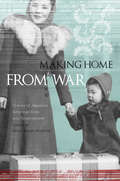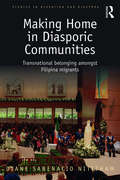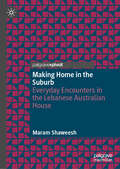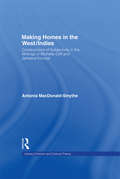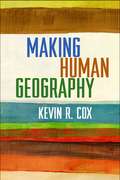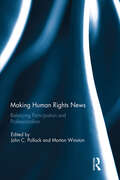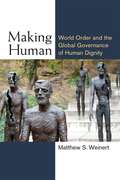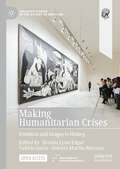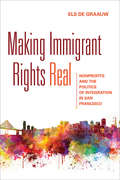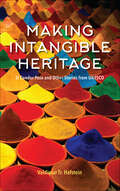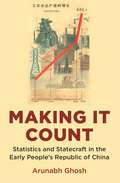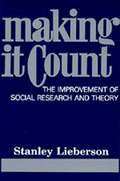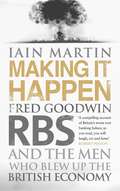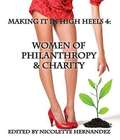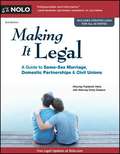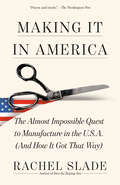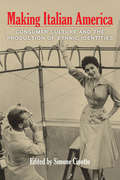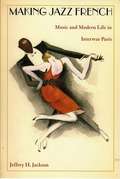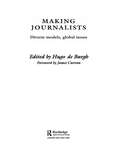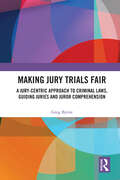- Table View
- List View
Making Home from War: Stories of Japanese American Exile and Resettlement
by Brian Komei DempsterThe sequel to the award-winning From Our Side of the Fence—personal stories of life after the WWII internment camps from twelve Japanese Americans. Many books have chronicled the experience of Japanese Americans in the early days of World War II, when over 120,000 persons of Japanese ancestry, two-thirds of whom were American citizens, were taken from their homes along the West Coast and imprisoned in concentration camps. When they were finally allowed to leave, a new challenge faced them—how do you resume a life so interrupted? Written by twelve Japanese American elders who gathered regularly at the Japanese Cultural and Community Center of Northern California, Making Home from War is a collection of stories about their exodus from concentration camps into a world that in a few short years had drastically changed. In order to survive, they found the resilience they needed in the form of community and gathered reserves of strength from family and friends. Through a spectrum of conflicting and rich emotions, Making Home from War demonstrates the depth of human resolve and faith during a time of devastating upheaval. &“I remember my release from Manzanar as scary and intense, but until now so little has been said about this aspect of the internment experience. This is an important book, its stories ground-breaking and memorable.&”—Jeanne Wakatsuki Houston, author of Farewell to Manzanar &“A deeply moving accounting of life after imprisonment, its lingering stigma, and the true meaning of freedom.&”—Dr. Satsuki Ina, producer of Children of the Camps
Making Home in Diasporic Communities: Transnational belonging amongst Filipina migrants (Studies in Migration and Diaspora)
by Diane Sabenacio NitithamMaking Home in Diasporic Communities demonstrates the global scope of the Filipino diaspora, engaging wider scholarship on globalisation and the ways in which the dynamics of nation-state institutions, labour migration and social relationships intersect for transnational communities. Based on original ethnographic work conducted in Ireland and the Philippines, the book examines how Filipina diasporans socially and symbolically create a sense of ‘home’. On one hand, Filipinas can be seen as mobile, as they have crossed geographical borders and are physically located in the destination country. Yet, on the other hand, they are constrained by immigration policies, linguistic and cultural barriers and other social and cultural institutions. Through modalities of language, rituals and religion and food, the author examines the ways in which Filipinas orient their perceptions, expectations, practices and social spaces to ‘the homeland’, thus providing insight into larger questions of inclusion and exclusion for diasporic communities. By focusing on a range of Filipina experiences, including that of nurses, international students, religious workers and personal assistants, Making Home in Diasporic Communities explores the intersectionality of gender, race, class and belonging. As such, it will appeal to scholars of sociology and anthropology as well as those with interests in gender, identity, migration, ethnic studies, and the construction of home.
Making Home in the Suburb: Everyday Encounters in the Lebanese Australian House
by Maram ShaweeshThis book investigates everyday life within Lebanese Australian homes, documenting how these homes integrate Lebanese Australian culture into suburban Australian life. It explores how the homemaking practices of Lebanese Australian families both influence and are influenced by the context of suburban housing in Australia. Drawing from in-depth interviews, household tours, photographic documentation, mental mapping, and historical imagery data collection, the book illuminates homemaking practices that have evolved from creating a "home away from home" to practices influenced by a unique Lebanese Australian lifestyle, rooted in the perception of Australia as their home.
Making Homes in the West/Indies: Constructions of Subjectivity in the Writings of Michelle Cliff and Jamaica Kincaid (Literary Criticism and Cultural Theory)
by Antonia Macdonald-SmytheThis study focuses on the ways in which two of the most prominent Caribbean women writers residing in the United States, Michelle Cliff and Jamaica Kincaid, have made themselves at home within Caribbean poetics, even as their migration to the United States affords them participation and acceptance within its literary space.
Making Homes: Ethnography and Design (Home Ser.)
by Sarah Pink Roxana Morosanu Val Mitchell Tracy Bhamra Kerstin Leder MackleyMaking Homes: Anthropology and Design is a strong addition to the emerging field of design anthropology. Based on the latest scholarship and practice in the social sciences as well as design, this interdisciplinary text introduces a new design ethnography which offers unique and original approaches to research and intervention in the home.Presenting a coherent theoretical and methodological framework for both ethnographers and designers, the authors examine ‘hot’ topics – ranging from movements and mobilities to im/material environments, to digital culture – and confront the challenges of a research and design environment which seeks to bring about the changes required for a sustainable, resilient, ‘safe’, and comfortable future.Written by leading experts in the field, the book draws on real-life examples from a wide range of international projects developed by the authors, other researchers, and designers. Illustrations throughout help to convey the methods and research visually. Readers will also have access to a related website which follows the authors’ ongoing research and includes video and written narrative examples of ethnographic research in the home.Transforming current understandings of the home, this is an essential read for students and researchers in fields such as design, anthropology, human geography, sociology, and media and communication studies.
Making Human Geography
by Kevin R. CoxThis book cogently examines how human geography has developed from a field with limited self-awareness regarding method and theory to the vibrant study of society and space that it is today. Kevin R. Cox provides an interpretive, critical perspective on Anglo-American geographic thought in the 20th and 21st centuries. He probes the impact of the spatial-quantitative revolution and geography's engagement with other social sciences, particularly in social theory. Key concepts and theories in the field are explained and illustrated with instructive research examples. Cox explores both how new approaches to human geography get constructed and what each school of thought has contributed to understanding the world in which we live.
Making Human Rights News: Balancing Participation and Professionalism
by John C. Pollock Morton E. WinstonMaking Human Rights News: Balancing Participation and Professionalism explores the impact of new digital technology and activism on the production of human rights messages. It is the first collection of studies to combine multidisciplinary approaches, "citizen witness" challenges to journalism ethics, and expert assessments of the "liberating role" of the Internet, addressing the following questions:1. What can scholars from a wide range of disciplines – including communication studies, journalism, sociology, political science, and international relations/studies – add to traditional legal and political human rights discussions, exploring the impact of innovative digital information technologies on the gathering and dissemination of human rights news?2. What questions about journalism ethics and professionalism arise as growing numbers of untrained "citizen witnesses" use modern mobile technology to document claims of human rights abuses?3. What are the limits of the "liberating role" of the Internet in challenging traditional sources of authority and credibility, such as professional journalists and human rights professionals?4. How do greater Internet access and human rights activism interact with variations in press freedom and government censorship worldwide to promote respect for different categories of human rights, such as women's rights and rights to health?This book was originally published as a special issue of the Journal of Human Rights.
Making Human: World Order And The Global Governance Of Human Dignity
by Matthew S. WeinertDifferences between human beings have long been used to justify a range of degrading, exclusionary, and murderous practices that strip people of their humanity and dignity. While considerable scholarship has been devoted to such dehumanization, Matthew S. Weinert asks how we might conceive its reverse--humanization, or what it means to "make human. " Weinert proposes an account of making human centered on five mechanisms: reflection, recognition, resistance, replication of dominant mores, and responsibility. Examining cases such as the UN Security Council's engagements with crises and the International Court of Justice's grappling with Kosovo's unilateral declaration of independence, he illustrates the distinct and contingent ways these mechanisms have been deployed. Theoretically, the cases evince a complex, evolving relationship between state-centric and human-centric views of society, ultimately revealing the normative potentialities of both. Though the case studies concern specific human relations issues on an international level, Weinert argues in favor of starting from the shared problem of being human and of living in a world in which the humanity of countless groups has been demeaned or denied. Working outward from that point, he proposes, we obtain a more pragmatically grounded understanding of the social construction of the human being.
Making Humanitarian Crises: Emotions and Images in History (Palgrave Studies in the History of Emotions)
by Dolores Martín-Moruno Brenda Lynn Edgar Valérie GorinThis open access collection of essays explores the emotional agency of images in the construction of ‘humanitarian crises’ from the nineteenth century to the present. Using the prism of the histories of emotions and the senses, the chapters examine the pivotal role images have in shaping cultural, social and political reactions to the suffering of others and to the establishment of the international networks of solidarity. Questioning certain emotions assumed to underlie humanitarianism such as sympathy, empathy and compassion, they demonstrate how the experience of such emotions has shifted over time. Understanding images as emotional objects, contributors from a wide horizon of disciplines explore how their production, circulation and reception has been crucial to the perception of humanitarian crises in a long-term historical perspective.
Making Immigrant Rights Real: Nonprofits and the Politics of Integration in San Francisco
by Els De GraauwMore than half of the 41 million foreign-born individuals in the United States today are noncitizens, half have difficulty with English, a quarter are undocumented, and many are poor. As a result, most immigrants have few opportunities to make their voices heard in the political process. Nonprofits in many cities have stepped into this gap to promote the integration of disadvantaged immigrants. They have done so despite notable constraints on their political activities, including limits on their lobbying and partisan electioneering, limited organizational resources, and dependence on government funding. Immigrant rights advocates also operate in a national context focused on immigration enforcement rather than immigrant integration. In Making Immigrant Rights Real, Els de Graauw examines how immigrant-serving nonprofits can make impressive policy gains despite these limitations.Drawing on three case studies of immigrant rights policies--language access, labor rights, and municipal ID cards--in San Francisco, de Graauw develops a tripartite model of advocacy strategies that nonprofits have used to propose, enact, and implement immigrant-friendly policies: administrative advocacy, cross-sectoral and cross-organizational collaborations, and strategic issue framing. The inventive development and deployment of these strategies enabled immigrant-serving nonprofits in San Francisco to secure some remarkable new immigrant rights victories, and de Graauw explores how other cities can learn from their experiences.
Making Intangible Heritage: El Condor Pasa and Other Stories from UNESCO
by Valdimar Tr. HafsteinIn Making Intangible Heritage, Valdimar Tr. Hafstein—folklorist and official delegate to UNESCO—tells the story of UNESCO's Intangible Heritage Convention. In the ethnographic tradition, Hafstein peers underneath the official account, revealing the context important for understanding UNESCO as an organization, the concept of intangible heritage, and the global impact of both. Looking beyond official narratives of compromise and solidarity, this book invites readers to witness the diplomatic jostling behind the curtains, the making and breaking of alliances, and the confrontation and resistance, all of which marked the path towards agreement and shaped the convention and the concept.Various stories circulate within UNESCO about the origins of intangible heritage. Bringing the sensibilities of a folklorist to these narratives, Hafstein explores how they help imagine coherence, conjure up contrast, and provide charters for action in the United Nations and on the ground. Examining the international organization of UNESCO through an ethnographic lens, Hafstein demonstrates how concepts that are central to the discipline of folklore gain force and traction outside of the academic field and go to work in the world, ultimately shaping people's understanding of their own practices and the practices themselves. From the cultural space of the Jemaa el-Fna marketplace in Marrakech to the Ise Shrine in Japan, Making Intangible Heritage considers both the positive and the troubling outcomes of safeguarding intangible heritage, the lists it brings into being, the festivals it animates, the communities it summons into existence, and the way it orchestrates difference in modern societies.
Making It Count: Statistics and Statecraft in the Early People's Republic of China (Histories of Economic Life #23)
by Arunabh GhoshA history of how Chinese officials used statistics to define a new society in the early years of the People’s Republic of China In 1949, at the end of a long period of wars, one of the biggest challenges facing leaders of the new People’s Republic of China was how much they did not know. The government of one of the world’s largest nations was committed to fundamentally reengineering its society and economy via socialist planning while having almost no reliable statistical data about their own country. Making It Count is the history of efforts to resolve this “crisis in counting.” Drawing on a wealth of sources culled from China, India, and the United States, Arunabh Ghosh explores the choices made by political leaders, statisticians, academics, statistical workers, and even literary figures in attempts to know the nation through numbers.Ghosh shows that early reliance on Soviet-inspired methods of exhaustive enumeration became increasingly untenable in China by the mid-1950s. Unprecedented and unexpected exchanges with Indian statisticians followed, as the Chinese sought to learn about the then-exciting new technology of random sampling. These developments were overtaken by the tumult of the Great Leap Forward (1958–61), when probabilistic and exhaustive methods were rejected and statistics was refashioned into an ethnographic enterprise. By acknowledging Soviet and Indian influences, Ghosh not only revises existing models of Cold War science but also globalizes wider developments in the history of statistics and data.Anchored in debates about statistics and its relationship to state building, Making It Count offers fresh perspectives on China’s transition to socialism.
Making It Count: The Improvement of Social Research and Theory
by Stanley LiebersonThere were many failures before humans successfully learned to fly. After watching birds flap their wings, bold and adventurous individuals built huge winglike structures, leaped off cliffs, flapped their wings vigorously, and broke their necks. There are principles of flight to be learned from watching the birds all right, but the wrong analogy had been drawn. In similar fashion, our empirical approach to social behavior is based on an analogy.
Making It Happen
by Iain MartinWhen RBS collapsed and had to be bailed out by the taxpayer in the financial crisis of October 2008 it played a leading role in tipping Britain into its deepest economic downturn in seven decades. The economy shrank, bank lending froze, hundreds of thousands lost their jobs, living standards are still falling and Britons will be paying higher taxes for decades to pay the clean-up bill. How on earth had a small Scottish bank grown so quickly to become a global financial giant that could do such immense damage when it collapsed? At the centre of the story was Fred Goodwin, the former chief executive known as "Fred the Shred" who terrorised some of his staff and beguiled others. Not a banker by training, he nonetheless was given control of RBS and set about trying to make it one of the biggest brands in the world. It was said confidently that computerisation and new banking products had made the world safer. Only they hadn't... Based on more than 80 interviews and with access to diaries and papers kept by those at the heart of the meltdown, this is the definitive account of the RBS disaster, a disaster which still casts such a shadow over our economy. In Making It Happen, senior executives, board members, Treasury insiders and regulators reveal how the bank's mania for expansion led it to take enormous risks its leaders didn't understand. From the birth of the Royal Bank in 18th century Scotland, to the manic expansion under Fred Goodwin in the middle of a mad boom and culminating in the epoch-defining collapse, Making It Happen is the full, extraordinary story.
Making It Happen: Fred Goodwin, RBS and the men who blew up the British economy
by Iain MartinWhen RBS collapsed and had to be bailed out by the taxpayer in the financial crisis of October 2008 it played a leading role in tipping Britain into its deepest economic downturn in seven decades. The economy shrank, bank lending froze, hundreds of thousands lost their jobs, living standards are still falling and Britons will be paying higher taxes for decades to pay the clean-up bill. How on earth had a small Scottish bank grown so quickly to become a global financial giant that could do such immense damage when it collapsed? At the centre of the story was Fred Goodwin, the former chief executive known as "Fred the Shred" who terrorised some of his staff and beguiled others. Not a banker by training, he nonetheless was given control of RBS and set about trying to make it one of the biggest brands in the world. It was said confidently that computerisation and new banking products had made the world safer. Only they hadn't... Based on more than 80 interviews and with access to diaries and papers kept by those at the heart of the meltdown, this is the definitive account of the RBS disaster, a disaster which still casts such a shadow over our economy. In Making It Happen, senior executives, board members, Treasury insiders and regulators reveal how the bank's mania for expansion led it to take enormous risks its leaders didn't understand. From the birth of the Royal Bank in 18th century Scotland, to the manic expansion under Fred Goodwin in the middle of a mad boom and culminating in the epoch-defining collapse, Making It Happen is the full, extraordinary story.
Making It In High Heels 4: Women of Philanthropy & Charity
by Nicolette HernandezSuccess. It means wanting something so grand, and finally taking it. But for young women, this wanting goes hand in hand with doubt and fear. Making it in High Heels addresses her inner voice that says, "I'm not good enough." It celebrates how successful women are able to tame that inner voice, and ultimately transform it into, "I am worth it! I can do this!" This group of superwomen do not only achieve success in their careers, but also have the confidence and desire to help causes close to their hearts. Discover how each woman's journey takes her to success, and the drive that pushes her to do even more.
Making It Legal: A Guide to Same-Sex Marriage, Domestic Partnerships and Civil Unions
by Emily Doskow Frederick HertzMore than 15,000 same-sex couples married in California after the California Supreme Court legalized marriage in May of 2008, and many more have married in Massachusetts, New York and six other states in recent years. Further, nearly one-half of the U. S. population lives in a state with some form of legal recognition for same sex couples - with more than 40% of these states' couples having registered their relationships. Authored by Frederick Hertz, a nationally recognized expert in same-sex relationship law, the updated 2nd edition of Making it Legal is a comprehensive, easy to understand guide to the past, present and future of same-sex law in America. Making It Legal offers lesbians and gay men a comprehensive review of all of the issues that influence the decision to marry or state-register and helps the reader navigate the complexity of same-sex laws and understand the newest legal options while providing practical guidance on how to make one of the most important decisions in one's lifetime. Making It Legal provides a brief history of the same-sex marriage movement, a survey of the current legal landscape and a view towards emerging trends and targets, and moves on to a discussion of the factors involved in the personal decision to marry along with the issues that every married couple may face: . Is a pre-nup agreement advisable and what does it involve? . How to evaluate the effect of taxes on shared lives? . When is a will or trust needed? . What are the special needs of couples with kids? . When to turn to professionals for help during disagreements? . How best to work with stepparents, past partners, and the blended family . and much more!
Making It in America: The Almost Impossible Quest to Manufacture in the U.S.A. (And How It Got That Way)
by Rachel SladeA moving and eye-opening look at the story of manufacturing in America, whether it can ever successfully return to our shores, and why our nation depends on it, told through the experience of one young couple in Maine as they attempt to rebuild a lost industry, ethically. • From the best-selling author of Into the Raging Sea Ben Waxman spent a decade organizing workers in Pennsylvania, Ohio, and Wisconsin, fighting for men and women at a time when national support for unions had sunk to an all-time low. Frustrated with the state of the world, he lands back in his hometown of Portland, Maine, to rethink his life. There, he meets Whitney Reynolds, a restless bartender eager for a challenge. In each other, they see a better future, a version of the American dream they can build together.Ben and Whitney set out to prove that union-made, all-American-sourced apparel manufacturing is possible in the twenty-first century. Their quest takes us across the nation and across time, from the cotton fields of Mississippi to the hollowed-out garment district in New York City to a family-owned zipper company in Los Angeles to the enormous knit-and-dye houses in North Carolina. While battling anti-immigrant hostility, trade wars, and a global pandemic, they grapple with the true meaning of made-in-USA in our globalized world.Making It in America offers a fascinating new take on free-trade economics and manufacturing history. Woven through the Waxmans&’ journey is the essential story of textiles and their critical role in shaping capitalism. It was the demand for cheap cloth that sparked the industrial revolution. It was the brutal conditions in New England's textile mills that first drove workers to organize. Making It in America is a deeply personal account of how individual choices shape a nation. Each touchpoint casts a rare, compassionate look at what came before, where we are now, and where we&’re going—through the people, places, and ecologies that produce the fabric of our lives.
Making It: Success in the Commercial Kitchen
by Ellen T. MeiserThe restaurant industry is one of the few places in America where workers from lower-class backgrounds can rise to positions of power and prestige. Yet with over four million cooks and food-preparation workers employed in America’s restaurants, not everyone makes it to the high-status position of chef. What factors determine who rises the ranks in this fiercely competitive pressure-cooker environment? Making It explores how the career path of restaurant workers depends on their accumulation of kitchen capital, a cultural asset based not only on their ability to cook but also on how well they can fit into the workplace culture and negotiate its hierarchical structures. After spending 120 hours working in a restaurant kitchen and interviewing fifty chefs and cooks from fine-dining establishments and greasy-spoon diners across the country, sociologist Ellen Meiser discovers many strategies for accumulating kitchen capital. For some, it involves education and the performance of expertise; others climb the ranks by controlling their own emotions or exerting control over coworkers. Making It offers a close and personal look at how knowledge, power, and interpersonal skills come together to determine who succeeds and who fails in the high-pressure world of the restaurant kitchen.
Making Italian America: Consumer Culture and the Production of Ethnic Identities (Critical Studies in Italian America)
by Simone CinottoA fascinating exploration of consumer culture in Italian American history and life, the role of consumption in the production of ethnic identities, and the commodification of cultural difference How do immigrants and their children forge their identities in a new land--how does the ethnic culture they create thrive in the larger society? Making Italian America brings together new scholarship on the cultural history of consumption, immigration, and ethnic marketing to explore these questions by focusing on the case of an ethnic group whose material culture and lifestyles have been central to American life: Italian Americans. As embodied in fashion, film, food, popular music, sports, and many other representations and commodities, Italian American identities have profoundly fascinated, disturbed, and influenced American and global culture. Discussing in fresh ways topics as diverse as immigrant women's fashion, critiques of consumerism in Italian immigrant radicalism, the Italian American influence in early rock 'n' roll, ethnic tourism in Little Italy, and Guido subculture, Making Italian America recasts Italian immigrants and their children as active consumers who, since the turn of the twentieth century, have creatively managed to articulate relations of race, gender, and class and create distinctive lifestyles out of materials the marketplace offered to them. The success of these mostly working-class people in making their everyday culture meaningful to them as well as in shaping an ethnic identity that appealed to a wider public of shoppers and spectators looms large in the political history of consumption. Making Italian America appraises how immigrants and their children redesigned the market to suit their tastes and in the process made Italian American identities a lure for millions of consumers. Fourteen essays explore Italian American history in the light of consumer culture, across more than a century-long intense movement of people, goods, money, ideas, and images between Italy and the United States--a diasporic exchange that has transformed both nations. Simone Cinotto builds an imaginative analytical framework for understanding the ways in which ethnic and racial groups have shaped their collective identities and negotiated their place in the consumers' emporium and marketplace. Grounded in the new scholarship in transnational U. S. history and the transfer of cultural patterns, Making Italian America illuminates the crucial role that consumption has had in shaping the ethnic culture and diasporic identities of Italians in America. It also illustrates vividly why and how those same identities--incorporated in commodities, commercial leisure, and popular representations--have become the object of desire for millions of American and global consumers.
Making Japan Work
by J.E. ThomasFirst Published in 2004. Routledge is an imprint of Taylor & Francis, an informa company.
Making Japanese Heritage (Japan Anthropology Workshop Series)
by Christoph BrumannThis book examines the making of heritage in contemporary Japan, investigating the ways in which particular objects, practices and institutions are ascribed public recognition and political significance. Through detailed ethnographic and historical case studies, it analyses the social, economic, and even global political dimensions of cultural heritage. It shows how claims to heritage status in Japan stress different material qualities of objects, places and people - based upon their ages, originality and usage. Following on an introduction that thoroughly assesses the field, the ethnographic and historiographic case studies range from geisha; noh masks; and the tea ceremony; urban architecture; automata; a utopian commune and the sites of Mitsubishi company history. They examine how their heritage value is made and re-made, and appraise the construction of heritage in cases where the heritage value resides in the very substance of the object’s material composition - for example, in architecture, landscapes and designs - and show how the heritage industry adds values to existing assets: such as sacredness, urban charm or architectural and ethnic distinctiveness. The book questions the interpretation of material heritage as an enduring expression of social relations, aesthetic values and authenticity which, once conferred, undergoes no subsequent change, and standard dismissals of heritage as merely a tool for enshrining the nation; supporting the powerful; fostering nostalgic escapism; or advancing capitalist exploitation. Finally, it considers the role of people as agents of heritage production, and analyses the complexity of the relationships between people and objects. This book is a rigorous assessment of how conceptions of Japanese heritage have been forged, and provides a wealth of evidence that questions established assumptions on the nature and social roles of heritage.
Making Jazz French: Music and Modern Life in Interwar Paris
by Jeffrey H. JacksonBetween the world wars, Paris welcomed not only a number of glamorous American expatriates, including Josephine Baker and F. Scott Fitzgerald, but also a dynamic musical style emerging in the United States: jazz. Roaring through cabarets, music halls, and dance clubs, the upbeat, syncopated rhythms of jazz soon added to the allure of Paris as a center of international nightlife and cutting-edge modern culture. In Making Jazz French, Jeffrey H. Jackson examines not only how and why jazz became so widely performed in Paris during the 1920s and 1930s but also why it was so controversial. Drawing on memoirs, press accounts, and cultural criticism, Jackson uses the history of jazz in Paris to illuminate the challenges confounding French national identity during the interwar years. As he explains, many French people initially regarded jazz as alien because of its associations with America and Africa. Some reveled in its explosive energy and the exoticism of its racial connotations, while others saw it as a dangerous reversal of France's most cherished notions of "civilization. " At the same time, many French musicians, though not threatened by jazz as a musical style, feared their jobs would vanish with the arrival of American performers. By the 1930s, however, a core group of French fans, critics, and musicians had incorporated jazz into the French entertainment tradition. Today it is an integral part of Parisian musical performance. In showing how jazz became French, Jackson reveals some of the ways a musical form created in the United States became an international phenomenon and acquired new meanings unique to the places where it was heard and performed.
Making Journalists: Diverse Models, Global Issues
by Hugo De BurghAt a time when the media’s relation to power is at the forefront of political discussion, this book considers how journalists can affect public discourse on politics, economy and society at large. From well-known and respected authors providing all new material, Making Journalists considers journalism education, training, practice and professionalism across a wide range of countries, including Saudi Arabia, Africa, India, USA and the UK. The book offers insights into: what journalism is how education makes the journalist and, therefore, the news models of journalism taught and practised across the globe the ethical implications of the process. When news reporting can lead to decisions on whether or not to got to war, everything can be affected by journalists and their mediation of the world. This text brings these present issues together in one invaluable resource for all students of journalism, politics and media studies.
Making Jury Trials Fair: A Jury-centric Approach to Criminal Laws, Guiding Juries and Juror Comprehension
by Greg ByrneThis book proposes using a ‘jury-centric approach’ for improving laws, practices, and procedures in jury trials. Courts assume that jurors in a criminal trial understand and apply the judge’s directions about the law. This assumption is based on jury verdicts and the courts’ observations of jurors and inferences about juror comprehension. Research reveals that the courts’ assumption about juror comprehension is fundamentally flawed. Addressing this problem is essential for fair trials. A jury-centric approach is evidence-informed and works within a fair trial framework. It asks what jurors need to understand the issues that they must determine. It also examines juror comprehension research and why judges and lawyers have often been sceptical about this research. The book illustrates and evaluates a jury-centric approach through three case studies involving structured decision-making aids, homicide laws, and misconceptions in sexual offence cases. The book proposes establishing an interdisciplinary Juries Advisory Council, drawing on judicial and legal expertise as well as expertise in jury research. The jury’s task is increasingly complicated. Reform is essential to help jurors understand their task and determine the issues on their legal and factual merits. The book will be a valuable resource for academics, researchers, policymakers, and students in the areas of Criminal Law, Courts, Human Rights Law, Psycholinguistics, and Organisational Psychology, and to judges and lawyers.
